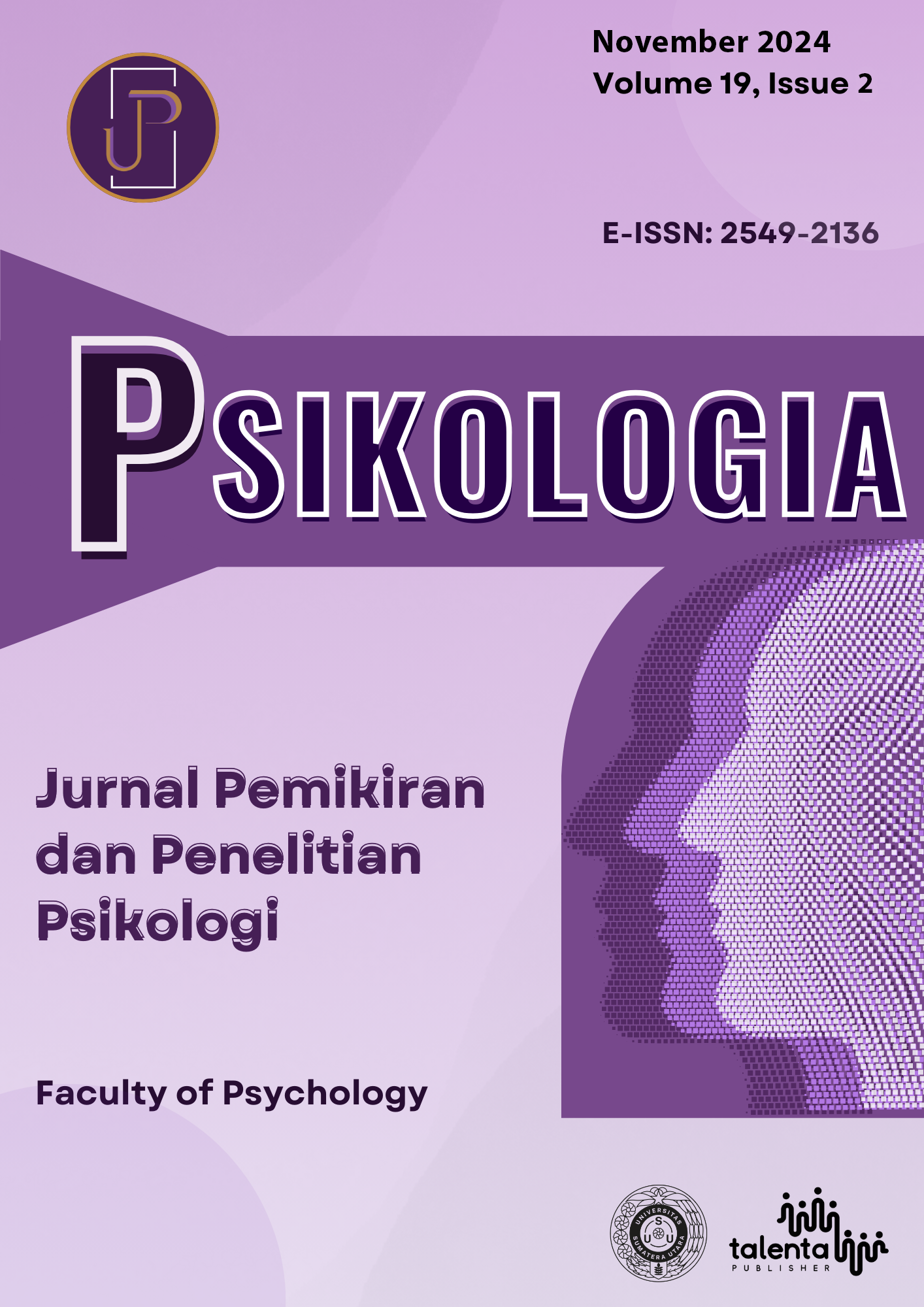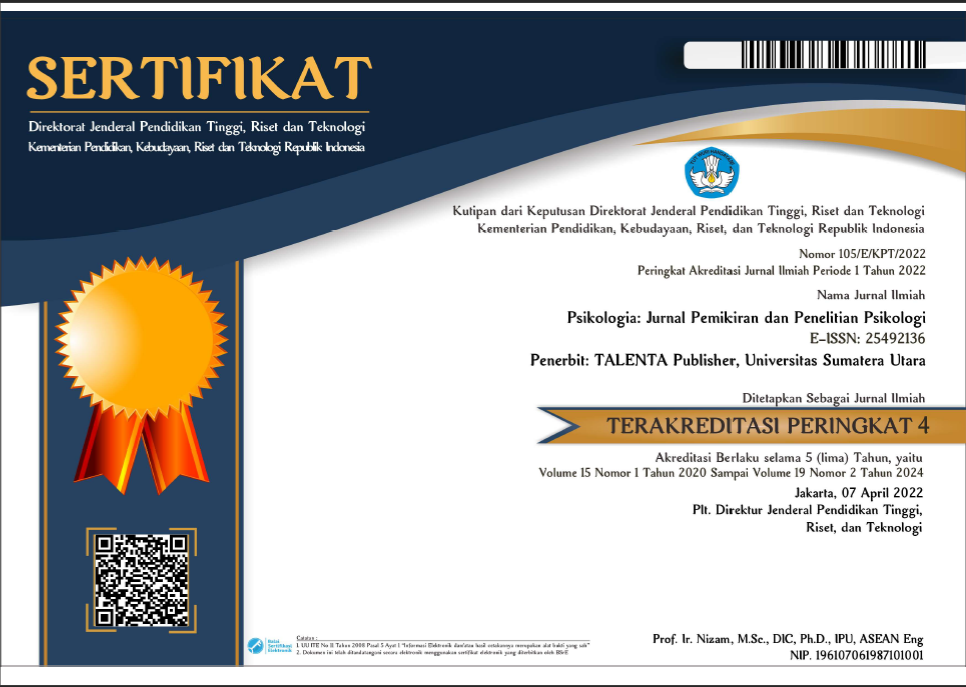Resilience in 3rd grade Muhammadiyah Vocational High School students: The impact of achievement emotions
DOI:
https://doi.org/10.32734/psikologia.v19i2.16959Keywords:
achievement emotions, resilience, studentAbstract
Third-year students at Vocational High School must meet many academic demands towards the end of their study period. These include fieldwork practices, report writing, attending sessions, taking tests, and preparing for exams and higher education. Such demands can affect their emotions and resilience, leading to a study being conducted to assess the impact of achievement emotions on their resilience. The research method employed in this study was quantitative, using a simple linear regression analysis technique. The research sample consisted of 183 third-grade students from SMK Muhammadiyah in Bandung, selected using a cluster random sampling technique. The study utilized two measuring tools: the achievement emotions scale and the resilience scale. The data collection method was a questionnaire, which was conducted both online and offline (paper-based). The results indicated that positive and negative emotions simultaneously influence the resilience of grade 3 vocational school students. Positive emotions play a significant positive role in increasing resilience, while negative emotions can reduce it. Educators and parents can focus on nurturing positive emotions in their students to create a positive learning environment. Cognitive restructuring may be the intervention strategy to change students' appraisal of learning situations so that they evoke enjoyment and relief and then eliminate boredom, making students more resilient.
Downloads
References
Abderrezag, S. (2010). The effects of Anxiety On Students’ Achievement The case of third year LMD students: Department of English University of Constantine. Ministry of Higher Education.
Arikunto, S. (2010). Prosedur Penelitian Suatu Pendekatan Praktek.
Block, J., & Kremen, A. M. (1996). IQ and ego-resiliency: conceptual and empirical connections and separateness. Journal of Personality and Social Psychology, 70(2), 349.
Christenson, S. L., Wylie, C., & Reschly, A. L. (2012). Handbook of Research on Student Engagement. Springer Nature.
Cohn, M. A., Fredrickson, B. L., Brown, S. L., Mikels, J. A., & Conway, A. M. (2009). Happiness unpacked: positive emotions increase life satisfaction by building resilience. Emotion, 9(3), 361.
Damayanti, D., & Widyowati, A. (2018). Peningkatan career decison making self efficacy (cdmse) melalui pelatihan perencanaan karir pada siswa smk. HUMANITAS, 15, 35. https://doi.org/10.26555/humanitas.v15i1.7409
Das, S., Punnoose, V. P., Doval, N., & Nair, V. Y. (2018). Spirituality, religiousness and coping in patients with schizophrenia: A cross sectional study in a tertiary care hospital. Psychiatry Research, 265, 238–243.
Denovan, A., & Macaskill, A. (2017). Stress and subjective well-being among first year UK undergraduate students. Journal of Happiness Studies, 18, 505–525.
Dharmayanti, W., & Munadi, S. (2014). Faktor-faktor yang memengaruhi minat siswa smp masuk SMK di Kota Pontianak. Jurnal Pendidikan Vokasi, 4(3), 405–419.
Folkman, S., & Lazarus, R. S. (1985). If it changes it must be a process: Study of emotion and coping during three stages of a college examination. Journal of Personality and Social Psychology, 48(1), 150.
Fredrickson, B. L. (2001). The role of positive emotions in positive psychology: The broaden-and-build theory of positive emotions. American Psychologist, 56(3), 218.
Goetz, T., Frenzel, A. C., Pekrun, R., & Hall, N. C. (2006). The domain specificity of academic emotional experiences. The Journal of Experimental Education, 75(1), 5–29.
Goleman, D. (1996). Emotional intelligence. Why it can matter more than IQ. Learning, 24(6), 49–50.
Hamama, L., Ronen, T., Shachar, K., & Rosenbaum, M. (2013). Links between stress, positive and negative affect, and life satisfaction among teachers in special education schools. Journal of Happiness Studies, 14, 731–751.
Herrman, H., Stewart, D. E., Diaz-Granados, N., Berger, E. L., Jackson, B., & Yuen, T. (2011). What is resilience? Canadian Journal of Psychiatry, 56(5), 258–265. https://doi.org/10.1177/070674371105600504
Hesketh, I., Ivy, J., & Smith, J. (2014). Keeping the Peelian spirit: Resilience and spirituality in policing. The Police Journal, 87(3), 154–166.
Khoiri Oktavia, W., & Muhopilah, P. (2021). Model konseptual resiliensi di masa pandemi covid-19: Pengaruh Religiusitas, dukungan sosial dan spiritualitas. Psikologika: Jurnal Pemikiran Dan Penelitian Psikologi, 26(1), 1–18. https://doi.org/10.20885/psikologika.vol26.iss1.art1
Kleinginna Jr, P. R., & Kleinginna, A. M. (1981). A categorized list of emotion definitions, with suggestions for a consensual definition. Motivation and Emotion, 5(4), 345–379.
Klohnen, E. C. (1996). Conceptual analysis and measurement of the construct of ego-resiliency. Journal of Personality and Social Psychology, 70(5), 1067.
Linnenbrink, E. A. (2007). The role of affect in student learning: A multi-dimensional approach to considering the interaction of affect, motivation, and engagement. In Emotion in education. Elsevier Academic Press.
Losada, M., & Heaphy, E. (2004). The role of positivity and connectivity in the performance of business teams: A nonlinear dynamics model. American Behavioral Scientist, 47(6), 740–765.
Low, M., King, R. B., & Caleon, I. S. (2016). Positive emotions predict students’ well-being and academic motivation: The broaden-and-build approach. The Psychology of Asian Learners: A Festschrift in Honor of David Watkins, 485–501.
Lyubomirsky, S., King, L., & Diener, E. (2005). The benefits of frequent positive affect: Does happiness lead to success? Psychological Bulletin, 131(6), 803.
Maggalinggam, A., & Ramlee, F. (2021). The relationship between positive emotion and resilience among undergraduate students. Int. J. Acad. Res, 11, 27–35.
Masten, A. S., & Obradović, J. (2006). Competence and resilience in development. Annals of the New York Academy of Sciences, 1094, 13–27. https://doi.org/10.1196/annals.1376.003
Mosqueiro, B. P., da Rocha, N. S., & de Almeida Fleck, M. P. (2015). Intrinsic religiosity, resilience, quality of life, and suicide risk in depressed inpatients. Journal of Affective Disorders, 179, 128–133.
Park, H.-S. (2001). Religiousness as a predictor of academic performance among high-school students. Journal of Research on Christian Education, 10(2), 361–378.
Pekrun, R. (2006). The control-value theory of achievement emotions: Assumptions, corollaries, and implications for educational research and practice. Educational Psychology Review, 18, 315–341.
Pekrun, R., Hall, N. C., Goetz, T., & Perry, R. P. (2014). Boredom and academic achievement: Testing a model of reciprocal causation. Journal of Educational Psychology, 106(3), 696.
Reivich, K., & Shatté, A. (2002). The Resilience Factor: 7 Essential Skills for Overcoming Life’s Inevitable Obstacles. Broadway books.
Riowati, R., & Maulina, M. (2022). Gambaran resiliensi akademik siswa smk di masa pandemi covid-19. Jurnal Teknologi Pendidikan, 11(2), 164–169.
Sari, J., & Suhariadi, F. (2019). Kontrak psikologis terhadap commitment to change: Resiliensi akademik sebagai variabel mediasi. Persona: Jurnal Psikologi Indonesia, 8(2), 178–192.
Scherer, K. R. (2000). Psychological models of emotion. The Neuropsychology of Emotion, 137(3), 137–162.
Schutz, P. A., & Pekrun, R. E. (2007). Emotion in education. Elsevier Academic Press.
Sedgwick, P. (2014). Cluster sampling. Bmj, 348(1215), 1-2.
Shin, S. J., Jung, D. Y., & Hwang, E. H. (2009). Concept analysis of resilience in patients with cardiovascular diseases. Journal of Korean Academy of Nursing, 39(6), 788–795. https://doi.org/10.4040/jkan.2009.39.6.788
Sugiyono, D. (2013). Metode Penelitian Pendidikan Pendekatan Kuantitatif, Kualitatif dan R&D. Alfabeta.
Hofmann, S. G., Dozois, D. J., Rief, W. E., & Smits, J. A. (2014). The Wiley handbook of cognitive behavioral therapy, Vols. 1-3. Wiley Blackwell.
Tugade, M. M., & Fredrickson, B. L. (2004). Resilient individuals use positive emotions to bounce back from negative emotional experiences. Journal of Personality and Social Psychology, 86(2), 320–333. https://doi.org/10.1037/0022-3514.86.2.320
Tyng, C. M., Amin, H. U., Saad, M. N. M., & Malik, A. S. (2017). The Influences of Emotion on Learning and Memory. Frontiers in Psychology. https://www.frontiersin.org/journals/psychology/articles/10.3389/fpsyg.2017.01454
Vötter, B. (2019). Crisis of meaning and subjective well-being: The mediating role of resilience and self-control among gifted adults. Behavioral Sciences, 10(1), 15.
White, B., Driver, S., & Warren, A. M. (2010). Resilience and indicators of adjustment during rehabilitation from a spinal cord injury. Rehabilitation Psychology, 55(1), 23-32. https://doi.org/10.1037/a0018451
Xie, L., & Kuo, Y.-L. (2021). Role of academic emotions in the relationship between academic achievement and resilience among eighth graders. New Waves-Educational Research and Development Journal, 24(1), 1–20.
Yang, M., Wang, J., Jing, Z., Liu, B., & Niu, H. (2022). Evaluation and regulation of resource-based city resilience: Evidence from Shanxi Province, China. International Journal of Disaster Risk Reduction, 81, 103256.
Yodchai, K., Dunning, T., Savage, S., & Hutchinson, A. M. (2017). The role of religion and spirituality in coping with kidney disease and haemodialysis in Thailand. Scandinavian Journal of Caring Sciences, 31(2), 359–367.
Downloads
Published
How to Cite
Issue
Section
License
Copyright (c) 2024 Tri Dewi Tunggal Bangun, Rika Dwi Agustiningsih , Rovi Husnaini

This work is licensed under a Creative Commons Attribution-ShareAlike 4.0 International License.









